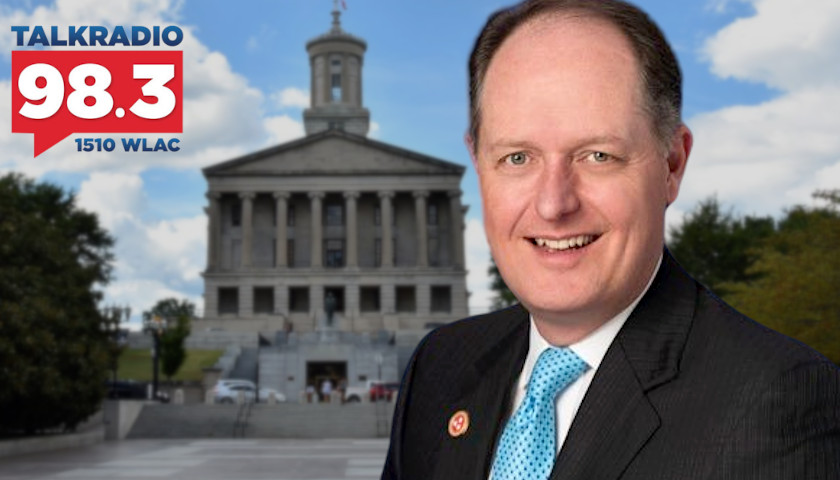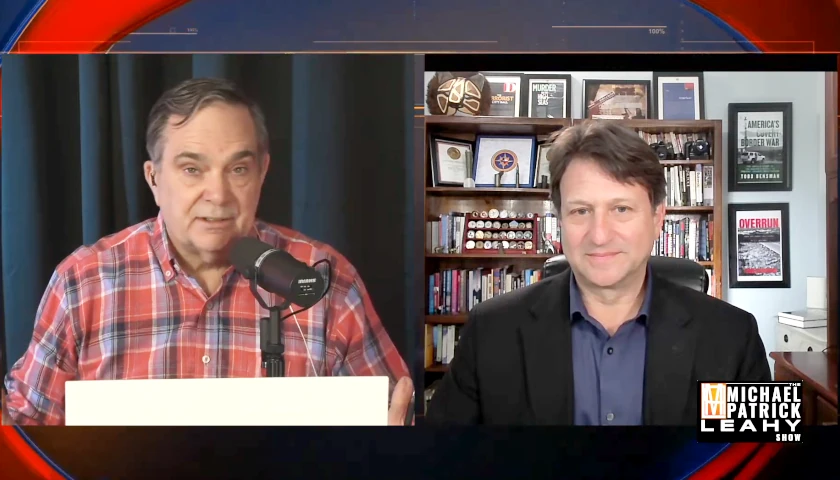Live from Music Row Wednesday morning on The Tennessee Star Report with Michael Patrick Leahy – broadcast on Nashville’s Talk Radio 98.3 and 1510 WLAC weekdays from 5:00 a.m. to 8:00 a.m. – host Leahy welcomed Tennessee Senate Majority Leader Jack Johnson to the newsmakers line to clarify and outline how a new bill set to pass would set guardrails on critical race theory being taught in public schools.
Leahy: We have State Senator Jack Johnson on the newsmaker line. Welcome and good morning Jack Johnson.
Johnson: Good morning, Michael and Crom. It’s great to be back with you guys.
Leahy: Well, State Senator Johnson, I sent you a text last night late. It was passed by bedtime, but it was important. I said, well, the Tennessee House has passed the bill banning critical race theory from K-12 public schools and it looks like a pretty good bill. It addresses the 11 specific tenants of critical race theory. It didn’t specifically say critical race theory.
Then I got a text from a grassroots group saying, oh, no, the state Senate didn’t pass it. There’s trouble in paradise. (Johnson laughs) To which I said, Jack, what’s up? And then you provided an explanation and share that with our audience, if you would, please.
Johnson: Sure. And thank you for the opportunity to do it, because I realized whenever we cast that procedural vote that it might be perceived last night that we were voting against the ban on teaching critical race theory in public schools. And that’s not the case at all. Because of our legislative process, we’re using a vehicle.
We’re using a bill that deals with another subject matter. But the caption of the bill, which is the way we work in Tennessee, the caption will hold the necessary language that we want to pass to ban the teaching of critical race theory. The Senate had already passed that bill, which, by the way, is sponsored by my friend Mike Bell, who is chairman of the Judiciary Committee and serves on the Education Committee.
And he’s very passionate about this issue. And he’s kind of taken the lead along with Brian Kelsey, who’s chairman of the Education Committee. And so the House put a mandatory language on the bill that we had already passed. When a bill has passed differently in each Chamber, then it has to go back to the other Chamber for that Chamber to either concur or non-concur with the action of the other Chamber.
When that bill came over, we had some language worked out with the House. But the stakeholders decided they wanted to make it even stronger. They want to make the language to ban critical race theory or the teaching of those tenants, as you say, even stronger longer than was originally drafted. And the only way procedurally to do that is to go to a conference committee.
Now that language has been worked out, you will see it. It will be made public later today because we’ll have that conference committee today. It’s going to add a couple of elements to what was passed by the House. And again, we are working collaboratively with the House on this. There is almost universal agreement among the Republican supermajorities that we want to get this passed in the best manner possible.
So we’ll have a conference committee today. The conference committee report will be taken out by each Chamber. It will pass overwhelmingly. We’re going to send it to the governor, and he will sign it.
Leahy: The conference committee makes the strengthening additions to the bill today. Does it go before the House for a vote in the Senate today or tomorrow?
Johnson: Today. That is correct. Let’s say that the House and again, it’s not the case with this bill, but it’s just procedurally, the only way we can get to where we want to go. But if you have a bill and the House and Senate have different versions and each Chamber is resolute in their version of the bill and the other side will not concur to the changes of the other Chamber, then you end up going to a conference committee.
And that’s where you sit down and negotiate and work it out. And if you can come to an agreement, that committee adopts a conference committee report and it’s signed off on by the members of the conference committee and then the bill is brought back to each Chamber, and you adopt that conference committee report just as if it was a brand new bill. And that’s what we’re going to do today. So we can get the strongest language possible past relative to critical race theory.
Leahy: So we’re talking with State Senator Jack Johnson, the majority leader in the state Senate. So it sounds to me, Jack, like our headline tonight at midnight, when we publish each day’s news stories at The Tennessee Star will be something like Tennessee General Assembly Passes Strongest Anti-Critical Race Theory Bill in America.
Johnson: That’s what I expect to be the case, and that’s what we want to do. Tennessee is a leader. We want to be a leader on this particular issue. But let me say something else, Michael, if I could as well. And I’ve had as you might imagine, dozens, if not hundreds of great conversations with constituents, moms, and dads whose children have been exposed to some of this material in Williamson County.
Public education is a partnership between the state and the local level we created. Many many years ago we created school districts, political subdivisions that act as school districts with local school boards for a reason. And that’s because teaching kids in inner-city Memphis is going to be different than Hancock County. And so you need local authority.
It’s still incredibly important, no matter what language we passed today and send to the governor to become law, that people are still engaged with their local school boards. And that is certainly happening in Williamson County and it’s happening all over the state. So this battle to stop this does not stop or end when we pass this legislation.
Because if there is a school system out there somewhere in Tennessee that is intent on teaching this propaganda to our kids, they’ll find a way to do it. So we’re going to set these guardrails and these parameters. And I think when you see the language we pass today, it’s very thorough, but it’s still critically important that people be engaged with their local school boards.
Carmichael: Senator, I’ve got a question for you. In the bigger cities, the teachers’ unions have such immense power, and the teachers’ unions essentially control the school boards. What can the state do about that? Because I understand what you’re saying. And it’s a nice idea that the local school board actually cares about the students.
It’s a nice idea. But in the bigger cities, the school board cares more about the union and the bureaucracy. And the result is that the education and many of our government-run schools, especially for Black and Hispanic children is just inadequate. It’s just terrible. What can be done about that where you just have these special interests that spend enormous amounts of money to get their people on the school board and control those giant budgets for their own interests?
Johnson: No, you’re exactly right, Crom. The teachers’ unions do have enormous power, especially in the larger cities. And they have significant influence over the election of school board members. We’ve made progress at the state level, but there’s more to do. Michael will remember, you may as well Crom, several years ago when I carried the legislation to end collective bargaining.
At one time, you think it’s bad now, at one time, school districts were required under state law to engage in collective bargaining with the local teachers union to pass raises, salaries, all kinds of things, working conditions, and so forth. And we did finally get that legislation passed to revert. It was the only instance in Tennessee where there was state-mandated collective bargaining with the union. So we did away with that, which was a significant step. But there is more to do.
Carmichael: Does the state have the authority to just do away with teachers’ unions in the state of Tennessee?
Johnson: No. It’s an interesting legal question. If people want to be part of an organization, then they can under state law. You hit the nail on the head, though, Crom. The problem comes in when they get so engaged and virtually are Kingmakers, if you will, relative to the local school board and the people who serve on the school board. So if the union doesn’t sign off or endorse you, in some instances, you can’t get elected.
So defacto they do have control over the body. What the state can do, and we know that we have serious issues in, particularly in Memphis and Nashville, relative to public education the governor and our Education Department is focused like a laser on those particular districts. We fund roughly two-thirds of their budget, so we have significant influence over them. But statutorily you do have a school board that has control over local decisions.
Leahy: Jack, later today, after the state Senate and the state House pass this strengthened anti-critical race theory bill, do you have any indication from the governor’s office as to his attitude about signing this particular bill?
Johnson: So I’ve not asked him specifically, but I know that the stakeholders, the chair of the Education Committee from both the Senate and the House have been in conversations with him as well. And I never speak for the governor or commit for him, but I feel quite confident that he will receive this legislation favorably and sign it. I’d be surprised if he didn’t.
Leahy: Well, sometimes there’s bad news we talk about politically. This sounds like it’s very good news.
Listen to the full second hour here:
– – –
Tune in weekdays from 5:00 – 8:00 a.m. to the Tennessee Star Report with Michael Patrick Leahy on Talk Radio 98.3 FM WLAC 1510. Listen online at iHeart Radio.




